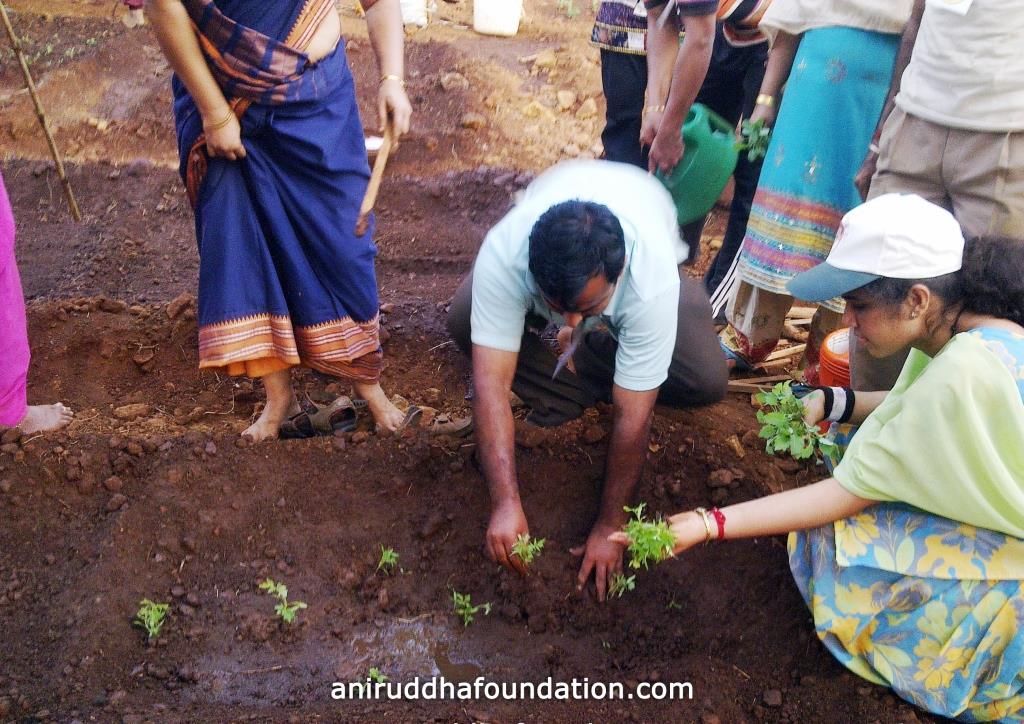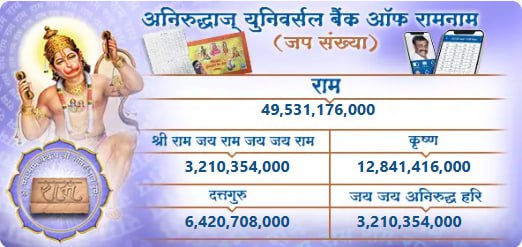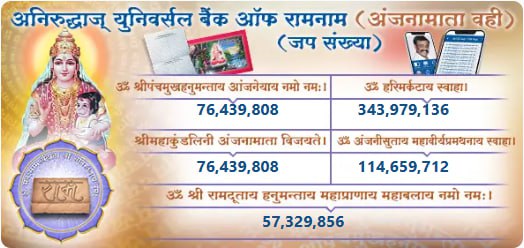Aniruddha’s Institute of Gramvikas (AIGV)
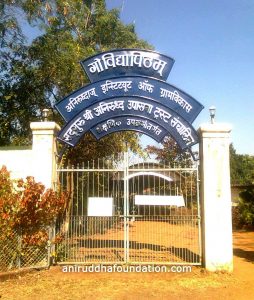 Rural development is only possible with the prosperity of farmers. Therefore, for the growth of the deprived farmers living in the rural villages and to make them independent while also instilling in them the realisation of their strength, Dr Aniruddha Joshi established the ‘Aniruddha’s Institute of Gram Vikas (AIGV)’ on 6th May 2010.
Rural development is only possible with the prosperity of farmers. Therefore, for the growth of the deprived farmers living in the rural villages and to make them independent while also instilling in them the realisation of their strength, Dr Aniruddha Joshi established the ‘Aniruddha’s Institute of Gram Vikas (AIGV)’ on 6th May 2010.
The main objective of the AIGV is to offer support to the hard-working, yet deprived farmers. It is not only essential to increase the yield of their farms, but also, more importantly, to reduce the expense of farming while meeting their basic household needs at absolutely no additional cost. Moreover, the prime objective of the AIGV is to contribute to the progress of the farmers in impoverished conditions with small schemes.
Sadguru Shree Aniruddha Bapu has chosen Shree Govidyapeetham, a land area located in Kothimbe village, Karjat District close to Mumbai for the AIGV.
To start, one of the most straightforward measures from the AIGV is the ‘Paras baug’ (Paras garden). Under the Paras baug, a small place in the house, and household equipment along with water, is used to cultivate easy-to-grow vegetables, fruits, climbing and vining vegetables, which are a part of one’s daily diet with planning as per season. In villages, it can be implemented in a small space in the front or back yard of the house whereas, it is popularly recognised in urban areas as a kitchen garden or a terrace garden as per its location.
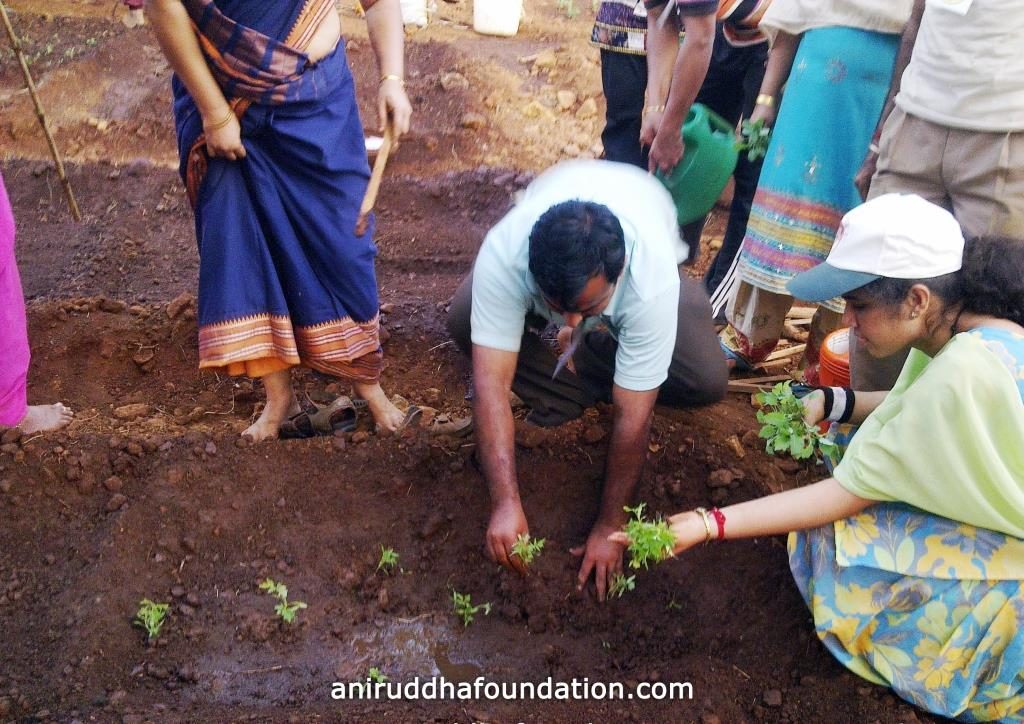 The AIGV has undertaken many programmes in Govidyapeetham, some of which have been on an experimental basis. Since 2013, courses on Shendriya Sheti (Organic Farming) and Pashu Palan (Animal Husbandry) are conducted during the period of eight months, from October to May every year. During the residential diploma course, training on organic farming is provided on low cost, non-poisonous, long-lasting techniques of farming with the available means and sources.
The AIGV has undertaken many programmes in Govidyapeetham, some of which have been on an experimental basis. Since 2013, courses on Shendriya Sheti (Organic Farming) and Pashu Palan (Animal Husbandry) are conducted during the period of eight months, from October to May every year. During the residential diploma course, training on organic farming is provided on low cost, non-poisonous, long-lasting techniques of farming with the available means and sources.
So far, farmers from Mumbai, Pune, Sangli, Satara, Kolhapur, Aurangabad, etc. have participated in the programme as also the project is being carried forward with its implementation in their surrounding rural areas. Additionally, volunteers from the organisation travel to different rural areas to even conduct half-day crash courses on Paras baug and Vermiculture. The AIGV continues to provide techniques to farmers on efficient usage of resources available with the farmers such as land, water and cattle.
The AIGV mainly focuses on Sendriya Sheti (organic farming), which cuts the spending on the use of harmful chemical fertilisers and pesticides. Also, training is provided on vermiculture fertiliser, cow dung fertiliser and compost fertiliser, and urea fertiliser. The methods of fermenting Nimark, Dashpaniark, Jeevamrut, Beejamrut are taught as well. Another project anchored here is on Azolla, which serves as a natural fertiliser for farming as also a feed for cattle.
Information on various trees is also provided under sessions on Forestation. They mainly focus on those trees, which can transform barren lands fertile, help prevent soil erosion and retain the water table levels. Also, knowledge of its seeding process in imparted.
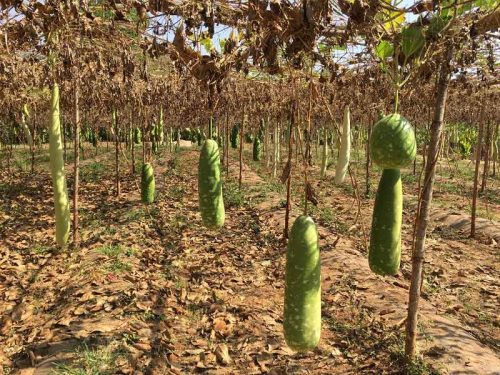 The course on Pashu Palan (Animal Husbandry) covers live demonstrations along with training, on rearing cows, buffalos, goats, as also, poultry farming with chickens, rabbits and quails. It comprises of everything from their diet, hygiene to health insurance. The number of people obtaining benefits through the supportive businesses the AIGV offers, to educate along with farming techniques, are on the rise.
The course on Pashu Palan (Animal Husbandry) covers live demonstrations along with training, on rearing cows, buffalos, goats, as also, poultry farming with chickens, rabbits and quails. It comprises of everything from their diet, hygiene to health insurance. The number of people obtaining benefits through the supportive businesses the AIGV offers, to educate along with farming techniques, are on the rise.
Recently, the Hydroponics technology, a technique that does not require the use of soil for farming, was taken up at the AIGV. By the use of the technology, fresh and nutritious cattle feed is produced throughout the year successfully in a Green House at very little expense. Under Sendriya Kheti (Organic farming), papayas, bananas, watermelons, ginger, pumpkins, turmeric and strawberries are grown at the AIGV. Many experiments are conducted to find best practices, which can prove extremely beneficial to farmers and such product is relatively larger.
The AIGV persistently works on the guided principle of Dr Aniruddha Joshi – the ‘Common Interest of Common Man’. He firmly believes that if the poor and hard-working farmers are provided with the necessary information and support, it would enable rural development and prosperity and most importantly, would avert farmer suicides.
In his discourse on Ram Rajya, Sadguru Shree Aniruddha Bapu had mentioned that the journey towards Ramrajya begins from the station of the Graamrajya (prosperity of villages) and the Graamrajya is Graamvikas (the development of villages). The statement in itself underscores the significance of the Aniruddha’s Institute of Gram Vikas (AIGV).

